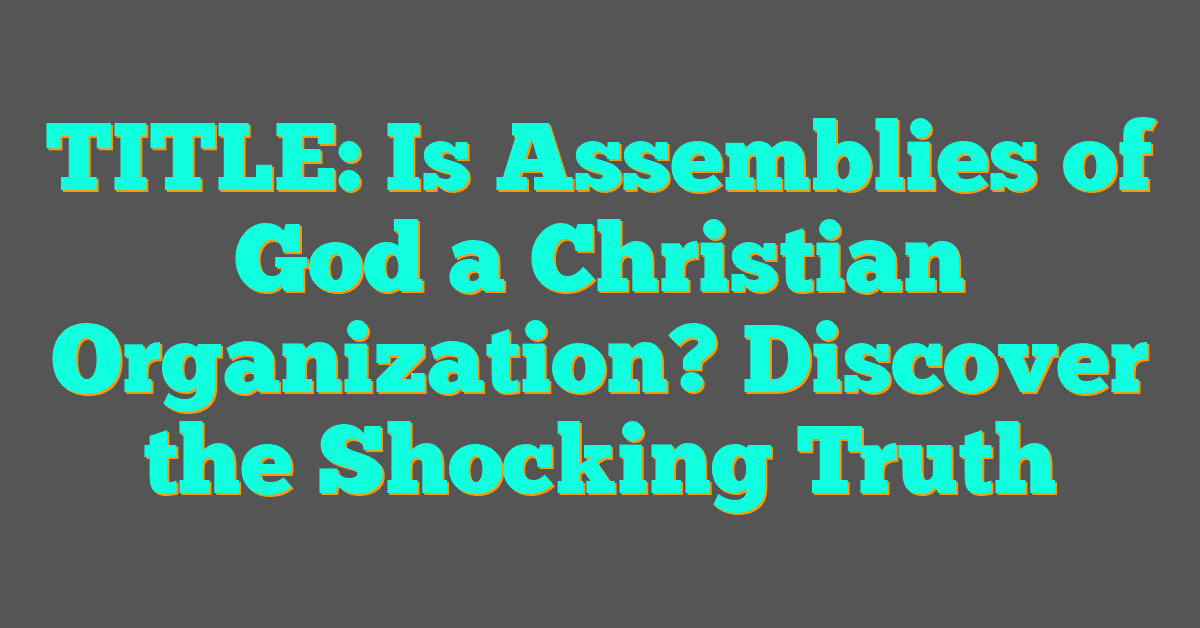Have you ever wondered whether the Assemblies of God truly fits within the Christian community? I found myself asking the same question, especially with so many diverse denominations out there. Exploring this topic can help us understand what defines a Christian organization.
The Assemblies of God has a rich history and a global presence that might make you think it’s just another Christian group. But what sets it apart? Let’s dive into their beliefs and practices to see how they align with the core tenets of Christianity.
Overview of Assemblies of God

I’ve found that the Assemblies of God (AG) stands out as one of the largest Pentecostal denominations worldwide. Established in 1914 in Hot Springs, Arkansas, it has grown to include over 69 million members across 199 countries. This global presence highlights its significant impact on Christianity today.
The core beliefs of the Assemblies of God align closely with mainstream Christian doctrines. They emphasize the authority of the Bible, the Trinity, and the salvation through Jesus Christ. A distinctive feature is their strong focus on the baptism of the Holy Spirit, which they believe empowers believers for service and witness.

Structurally, the AG operates with a congregational polity, giving individual churches a degree of autonomy while maintaining unity through national and international assemblies. This organization allows for both local flexibility and global cohesion.
Missions and ministries are integral to the Assemblies of God’s mission. They run numerous educational institutions, hospitals, and humanitarian aid programs. For instance, their Global Ministries work is active in disaster relief and community development, demonstrating their commitment to both spiritual and practical support.
Understanding these aspects helps clarify why the Assemblies of God is recognized as a significant Christian organization, both in the United States and around the world.
Core Beliefs and Doctrines
Assemblies of God upholds foundational Christian doctrines while emphasizing unique Pentecostal teachings. These beliefs guide the faith and practices of its global membership.
Salvation and the Trinity
Assemblies of God affirms the Trinity, believing in one God expressed in three persons: Father, Son, and Holy Spirit. Salvation is through faith in Jesus Christ alone. The Bible serves as the ultimate authority, shaping beliefs and actions. Believers are encouraged to develop a personal relationship with Jesus, leading to eternal life.
Baptism and Communion
Baptism by immersion symbolizes a believer’s faith and commitment to Christ. It’s a public declaration of transformation and new life. Communion, or the Lord’s Supper, commemorates Jesus’ sacrifice. Regular participation fosters spiritual growth and community unity. These practices reinforce the believer’s connection to God and the church.
Organizational Structure
The Assemblies of God (AG) maintains a structured framework that balances local autonomy with overarching unity. This organization facilitates coordinated efforts across its global network.
Leadership and Governance
The AG operates under a hierarchical leadership model, ensuring consistency and direction across all levels. At the top, the General Council serves as the primary governing body, setting policies and strategic initiatives. National and regional districts manage local churches, providing support and oversight while respecting each congregation’s independence. Local pastors lead individual churches, implementing AG doctrines and fostering community engagement. This structure promotes both unity and flexibility, allowing the AG to address diverse cultural contexts effectively.
Assemblies of God in the Christian Community
The Assemblies of God plays a vital role within the global Christian community. Its distinct Pentecostal beliefs and expansive missionary work set it apart from other denominations.
Comparison with Other Denominations
The Assemblies of God shares core Christian doctrines with many denominations, such as the belief in the Trinity and salvation through Jesus Christ. However, it emphasizes the baptism of the Holy Spirit more strongly than, say, Baptist or Methodist churches. While Baptists prioritize believer’s baptism by immersion, the Assemblies of God also focuses on spiritual gifts like speaking in tongues and healing.

Structurally, the Assemblies of God operates with a congregational polity, granting autonomy to local churches. In contrast, denominations like the Catholic Church have a hierarchical structure with centralized authority. This autonomy allows Assemblies of God churches to adapt practices to their cultural contexts effectively.
Worship styles also differ. Assemblies of God services are typically vibrant and expressive, incorporating contemporary music and lively preaching. Methodist services might be more liturgical, following a set order of worship. This energetic approach attracts many young believers seeking an engaging spiritual experience.
Missionary efforts distinguish the Assemblies of God as well. With over 69 million members in 199 countries, their global outreach is extensive. Other denominations may have significant missionary work, but the Assemblies of God’s scale and organization make it one of the largest Pentecostal bodies worldwide.
| Denomination | Governance | Baptism Focus | Worship Style | Global Presence |
|---|---|---|---|---|
| Assemblies of God | Congregational | Baptism of the Holy Spirit | Vibrant and expressive | 69 million members in 199 countries |
| Baptist | Congregational | Believer’s baptism by immersion | Traditional to contemporary | Extensive, varies by region |
| Catholic | Hierarchical | Infant and believer’s baptism | Liturgical | Over 1 billion members globally |
| Methodist | Connectional | Infant and believer’s baptism | Liturgical to contemporary | Approximately 80 million members |
This comparison highlights how the Assemblies of God maintains its unique identity while contributing significantly to the Christian landscape. Its emphasis on the Holy Spirit, flexible governance, dynamic worship, and expansive missionary work distinguishes it from other Christian denominations.
Conclusion
Exploring the Assemblies of God shows just how deeply rooted they are in the Christian faith. Their dedication to the Bible and shared core beliefs really highlights their identity as a Christian organization.
I find their vibrant worship style and global mission efforts truly inspiring. It’s amazing to see how they connect people and make a positive impact around the world.
Whether you’re searching for a new church community or curious about different Christian traditions the Assemblies of God offers a welcoming and dynamic environment that stays true to its Christian values.












